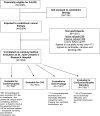Cardiac Outcomes in Adult Survivors of Childhood Cancer Exposed to Cardiotoxic Therapy: A Cross-sectional Study
- PMID: 26747086
- PMCID: PMC4809016
- DOI: 10.7326/M15-0424
Cardiac Outcomes in Adult Survivors of Childhood Cancer Exposed to Cardiotoxic Therapy: A Cross-sectional Study
Abstract
Background: Studies of cardiac disease among adult survivors of childhood cancer have generally relied on self-reported or registry-based data.
Objective: To systematically assess cardiac outcomes among survivors of childhood cancer.
Design: Cross-sectional study.
Setting: St. Jude Children's Research Hospital.
Patients: 1853 adult survivors of childhood cancer, aged 18 years or older, who received cancer-related cardiotoxic therapy at least 10 years earlier.
Measurements: Baseline history and physical examination, fasting metabolic and lipid panels, echocardiography, electrocardiography, and 6-minute walk test.
Results: One half of the survivors (52.3%) were men with a median age of 8 years (range, 0 to 24 years) at cancer diagnosis and 31 years (range, 18 to 60 years) at evaluation. Cardiomyopathy was present in 7.4% survivors (newly identified at the time of evaluation in 4.7%), coronary artery disease in 3.8% (newly identified in 2.2%), valvular regurgitation or stenosis in 28.0% (newly identified in 24.8%), and conduction or rhythm abnormalities in 4.4% (newly identified in 1.4%). Nearly all survivors were asymptomatic. The prevalence of cardiac conditions increased with age at evaluation, ranging from 3% to 24% among survivors aged 30 to 39 years to 10% to 37% among those aged 40 years or older. In multivariable analysis, survivors exposed to anthracycline doses of 250 mg/m2 or more had greater odds of cardiomyopathy (odds ratio, 2.7 [95% CI, 1.1 to 6.9]) than those who were not exposed. Survivors exposed to heart radiation also had increased odds of cardiomyopathy (odds ratio, 1.9 [CI, 1.1 to 3.7]) compared with those who were not exposed. Radiation exposure greater than 1500 cGy with any anthracycline exposure conferred the greatest odds for valve findings.
Limitations: Sixty-one percent of survivors exposed to anthracycline chemotherapy or cardiac-directed radiation participated. A comparison group and longitudinal assessments were not available.
Conclusion: Cardiovascular screening identified considerable subclinical disease among adult survivors of childhood cancer.
Primary funding source: National Cancer Institute, American Lebanese Syrian Associated Charities.
Trial registration: ClinicalTrials.gov NCT00760656.
Comment in
-
Adult survivors of childhood cancer are at high risk of cardiac abnormalities, study finds.BMJ. 2016 Jan 4;352:h7026. doi: 10.1136/bmj.h7026. BMJ. 2016. PMID: 26732348 No abstract available.
Summary for patients in
-
Summaries for Patients. Heart Problems in Adults Who Survived Cancer as Children.Ann Intern Med. 2016 Jan 19;164(2). doi: 10.7326/P16-9003. Epub 2016 Jan 5. Ann Intern Med. 2016. PMID: 26747372 No abstract available.
References
-
- Howlader N, Noone A, Krapcho M, Neyman N, Aminou R, Waldron W, et al. SEER Cancer Statistics Review, 1975-2009. Bethesda, MD: National Cancer Institute; 2011. Vintage 2009 Populations.
Publication types
MeSH terms
Substances
Associated data
Grants and funding
LinkOut - more resources
Full Text Sources
Other Literature Sources
Medical

